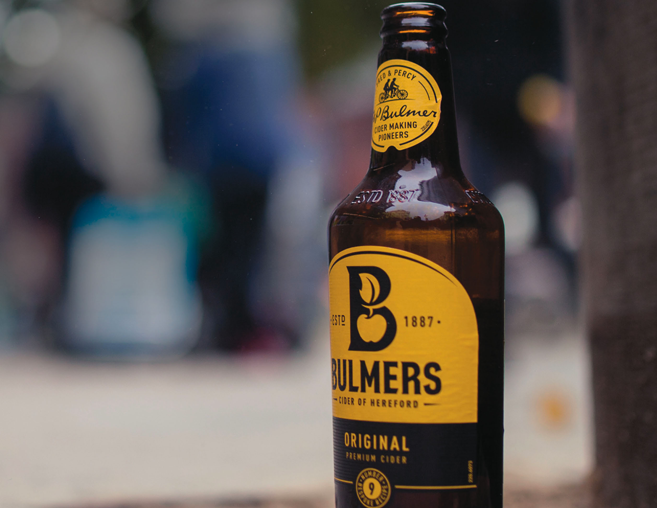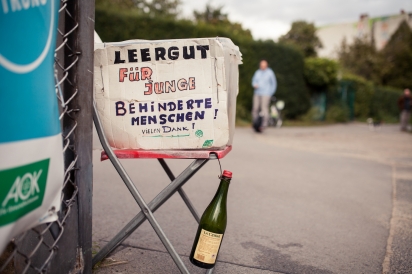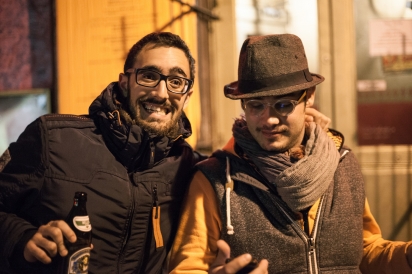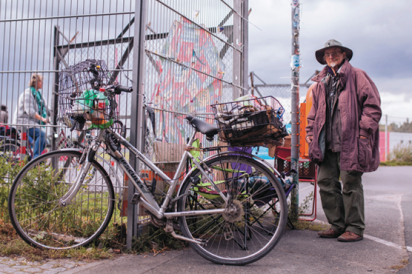Ninety-Nine Bottles of Beer on the Ground: Berlin Bottle Hunters
On a wall next to Berlin’s River Spree, shiny brown beer bottles sit like ducks in a row, neatly lined up for anyone to spot. There’s shiny gold on the label of Munich’s Augustiner lager, the stained-window graphics of Rothaus’ Tannenzäpfle pilsner and the stark monochrome of the German capital’s own “Bier” beer—all rubbing shoulders, emptied by their owners. Outside the muffled thumping of the techno clubs, next to the thudding rumbles of U-Bahn stations and at the edges of parks all over Berlin, you’ll find these markers of the outdoor drinking culture, where a drink from the späti (bodega) is a crucial part of every journey.
This shrapnel of the night out, however, isn’t just lazy littering, since each bottle of beer carries a pfand, or deposit, of eight cents, and a large plastic bottle (of sparkling water, perhaps, which the Germans consume religiously) carries 25 cents. Since 2003, these deposits have been applied by law to packaging for sales of carbonated drinks and beer (non-carbonated drinks, wine, milk and spirits are exempt). At the supermarket, a giant machine automatically values and swallows bottles up whole, returning them to the breweries and factories to be refilled, while whoever returns them redeems the deposit in cash. The amounts are small enough that they’re unnoticeable for a customer to pay when purchasing, but when collected in bulk, they’re worth handing in.
It’s a common sight to see one of these “bottle entrepreneurs” with a shopping cart or bicycle making their way through a park on a sunny day, stopping at picnicking groups to ask if they have any bottles they’re finished with. And rather than carry their own bottles back home or to the supermarket—why wouldn’t people take the convenient option? As well as making a small donation to those who are out of work or down on their luck, this system also helps the environment, and provides an incentive to keep the city streets clean.
Mostly, bottle collectors are pensioners, like Michaela W., who lives near an art complex in Kreuzberg, the trendy, former West Berlin neighborhood. When she hears the telltale chitchat and skittering beats of an opening or party, she drops over to the Brutalist gardens of the ex-church gallery space, to see if the attendees have left any pfand lying around. She collects bottles because she finds it hard to get by on her pension money from the state—those she collects from the guzzling guests at this art exhibition will help pay for her health insurance. There are also those who have turned bottle-collection into a full-scale enterprise, complete with Facebook pages and brand names—such as The King of Bottles, who has a bike trailer spraypainted with his moniker, to help his donors spot him easily. Scavenging also provides a small way for homeless people to earn some cash without administrative requirements of a fixed address.
Various startups have sought to formalize these donations and make them more convenient for those receiving and giving them. For example, if you have a party in your flat, the sheer number of glass bottles can easily add up to a heavy load to return to the gobbling recycling machine.
The website Pfandgeben (literally “deposit-giving”), allows those with a bottle surplus to connect with those who need the deposits. “It’s a win-win situation,” says Jonas Kakoschke, who started the website in 2011 as part of his communications degree. “It’s used by small offices and agencies also—even my current coworking space.” The graphic designer and social entrepreneur credits the success of his website to the importance of the human interaction it facilitates: “Rather than just putting their bottles on the street, people want to see the face of the person they’re donating to,” he says.
Meanwhile, the campaign Pfand gehört daneben (roughly “Deposits belong alongside”) began in 2015 to encourage those drinking unterwegs (on the way) to place their bottles next to the garbage, rather than inside the can, allowing those collecting deposits to simply pick them up, instead of sticking their arm into the dirty and potentially dangerous receptacle to find those eight-cent treasures. With 172 million euros’ worth of bottles being thrown away each year, it’s a simple act of solidarity with those less fortunate. Soft drink manufacturer Fritz Kola now has the catchphrase printed on the front of its bottles.
This system hugely affects the culture of how Berliners drink, particularly in the summer, when the parks and canal banks fill up with huddles of socially inclined drinkers. Separating the bottles from the rest of the trash is an accepted act of polite social responsibility—by donating them or leaving them for someone else, the communal activity of drinking with friends almost automatically includes a small donation to the least fortunate in the local neighborhood. For example, at the edge of Tempelhofer Feld, a disused airport whose bike-friendly runways are a popular sunset spot for locals, collection carts sit ready for anyone exiting the park to drop what they’ve drunk. These receptacles are collected by a group of friendly women, whose signs say that their pfand will be donated to help support young people in the local community.
What could have been an inconvenient innovation from the German government, mandating consumer participation in environmental policy, has turned into a way to redistribute money to the needy, keep the city clean and be socially responsible with your recycling. And it’s a boon for Berlin’s drinking population, from the barbecuing family in Volkspark Friedrichshain, to the old men playing boules by the Landwehr canal, to the students sipping lager on the U-Bahn on their way to the club.
Local Taste: Just Scrapping By
One bottle and can at a time, scrappers across New York City collect discarded containers to turn a profit at recycling redemption centers, making a meager living a nickel at a time (far less than the pfand offered by the German government). Can collecting as we know it became a “thing” in 1982, when New York enacted its Bottle Bill, as part of environmental conservation legislation to incentivize recycling across the city, to reduce litter and ease the burden on solid waste facilities.











